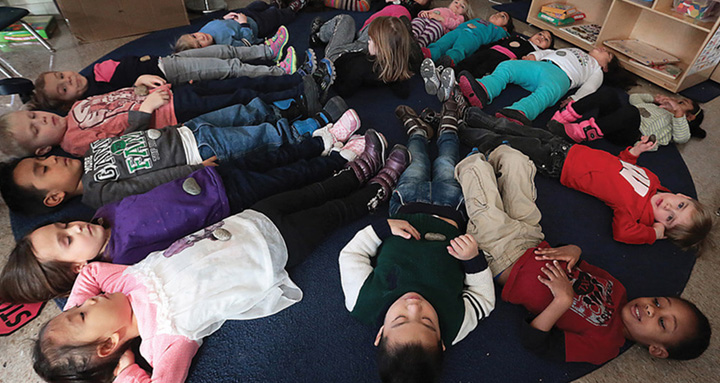
Can a rock on the stomach make children better students, happier adults, and healthier people?
No.
On its own, a rock is just a rock. But when children have the right training, UW researchers in the Center for Healthy Minds (CHM) find, they can turn those rocks into “belly buddies” to learn mindfulness techniques, which may hold the key to improving their mental and emotional health. CHM did a 12-week study with children in the Madison Metropolitan School District and found that those who had participated in a Kindness Curriculum showed better academic performance and prosocial measures than those who hadn’t.
This is the kind of news Bob and Dottie King are looking for. They know that about 20 percent of American adolescents suffer from some form of psychiatric disorder and want the UW to help. That’s why they’ve given $10 million to CHM.
“We’re thrilled to collaborate with UW–Madison in our determination to help disadvantaged youth reach their full potential,” says Dottie. “We believe the work of Richard Davidson and his colleagues at the center will have a tremendous impact and help thousands — if not millions — of youth thrive.”
“We’re thrilled to collaborate with UW–Madison in our determination to help disadvantaged youth reach their full potential.”
Dottie King
The gift will enable the university to recruit interdisciplinary faculty to focus on children and well-being. Center scientists and staff look forward to a partnership with the Thrive Foundation for Youth, which the King family founded to support intensive engagement with disadvantaged youth. An increasing body of evidence indicates that adolescence is a period when the brain is more sensitive and pliable and presents opportunities to build critical emotional skills to cultivate well-being. The center is leading the development and assessment of mental training strategies to cultivate healthy qualities of mind in children and adolescents.
“Assessment remains a huge challenge for the field, but it’s what’s critically needed to answer important questions,” says Richard Davidson, founder of the center and the William James and Vilas Professor of Psychology and Psychiatry. “How does one measure development of noncognitive factors? How do those measures change with students’ age? Are some interventions more effective than others? We need to build a common language to measure success.”
The Kings have a deep interest in alleviating difficult problems. In late 2016, they joined with John and Tashia Morgridge to give UW–Madison $36 million for the creation of the King-Morgridge Scholars Program, which will provide four-year scholarships to students from developing countries, so that they can learn skills that will help them to address the challenges in their home nations.
